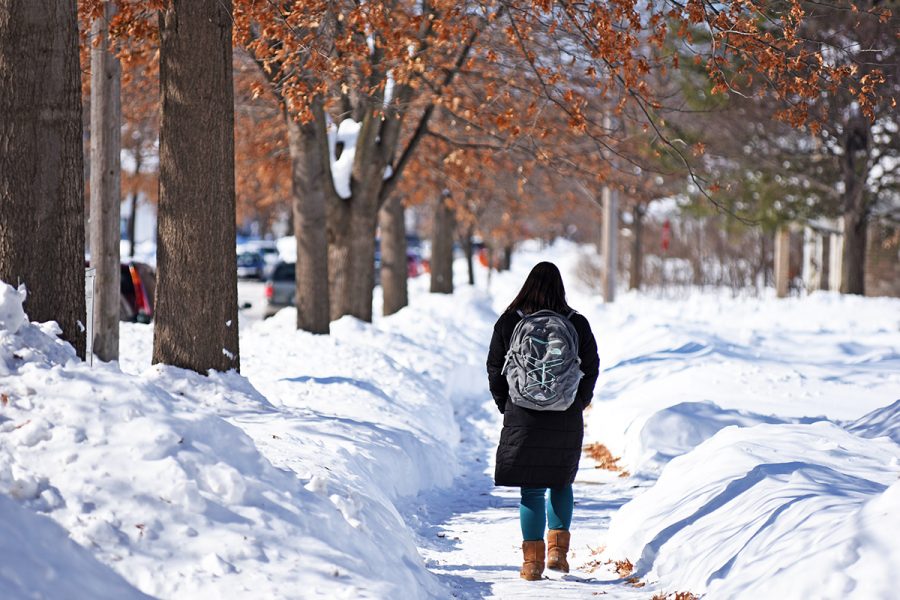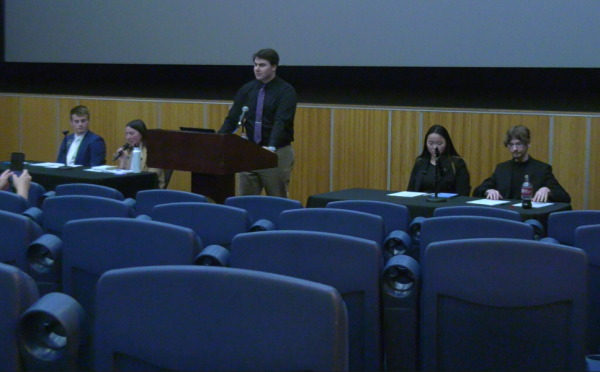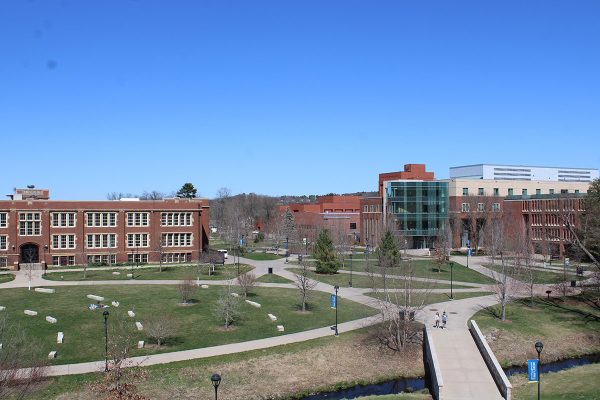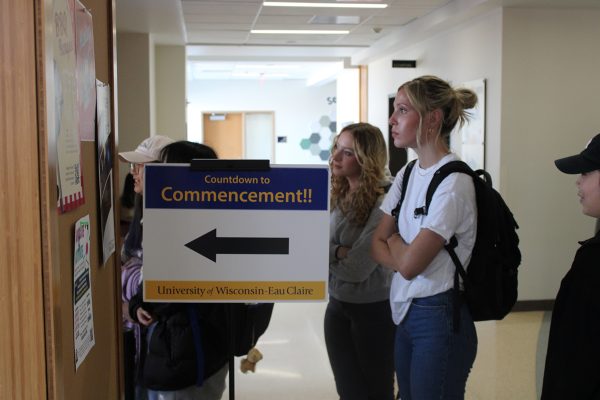Record February snowfalls mean business as usual for UWEC
University administration resists snow days for the benefit of ‘90 percent’ of student body
Photo by Elena Dawson
Eau Claire has been hit with record-setting amounts of snow so far this month, but the university has yet to cancel a full day of classes as a result.
To the tune of revving car engines and the sound of car tires hopelessly spinning in place, UW-Eau Claire students trudged through unplowed streets and sidewalks on Feb. 12 to attend classes in the midst of another unusual winter event — a snow storm contributing to accumulated Eau Claire snowfall already 62 percent above the community’s historical average, according to HowMuchWillitSnow.com.
Despite extreme weather such as this, UW-Eau Claire classes will continue as scheduled unless university administration deems conditions hazardous to the health and wellbeing of the students and staff, said Michael Rindo, assistant chancellor for facilities and university relations.
“We live in Wisconsin and winter is a reality and so we do get a fair amount of cold and a fair amount of snow,” Rindo said. “As (Chancellor James C. Schmidt) says, it’s very rare that we’re going to cancel classes. Students are paying tuition. We need to be respectful of the face that they are paying for their instruction. We cannot, like K-12 schools, extend our academic year.”
Rindo said UW-Eau Claire is primarily a residential campus. With an estimated 90 percent of Eau Claire students living on or within walking distance of campus, commuting students are not as prevalent as with universities like UW-Eau Claire-Barron County, which did cancel classes on Feb. 12, Rindo said.
While the university does work hard to ensure clear pathways, parking lots, and streets on or around campus, it is the city that is responsible for clearing the back roads where many of the off-campus students live, Rindo said. Likewise, it is often the individual responsibility of landlords and renters to clear the sidewalks along these streets.
“Because so many of our students live either on campus or in such close proximity to campus, we know that the vast majority of our students can get to class,” Rindo said.
As for students who are physically unable to maneuver the snow and ice — people in wheelchairs, on crutches or in similar situations — Rindo said a van service is provided through the Office for Students with Disabilities and Housing and Residence Life.
Mareena Ribich, a third-year biology student, said she has been affected by the severe weather conditions because of the boot her foot has been in for the past month.
Ribich said she had no choice but to attend her labs on Feb. 12, despite the fact that her boot continuously scoops up snow, and has no real traction. Ribich said she has even fallen on campus because of it, both because of the ice on the sidewalks, and the wet halls in the buildings.
In her opinion, classes should be cancelled during winter storms like the ones this month.
“I’ve been finding getting around really difficult,” Ribich said. “I can’t imagine — around last week — what it would’ve been like for people on crutches to get around, because it would’ve been impossible. They would’ve been flying off the sidewalks.”
Rindo said he does understand some students and faculty have to drive greater distances to attend classes or go to work. He said, if this is the case, students should make arrangements with their professors and stay home if they ever feel as though their safety is being put at risk.
It is a “personal judgement,” Rindo said.
“Personal safety is very important,” Rindo said. “We never want to have anyone endanger themselves in order to get to campus.”
Aaron Turek, grounds supervisor of two years with UW-Eau Claire, said a lot of forethought goes into cancelling classes. During major winter events, such as the ones Eau Claire experienced in February, nine grounds services workers arrive on campus around 2 a.m. to begin the process of clearing high-priority areas, like the hill, campus streets, commuter parking lots and sidewalks, the mall and hill steps, Turek said.
“Our goal is to get as much of the main traffic areas clear of snow before you guys head out for your first class,” Turek said. “It makes it easier for you and for us.”
According to Rindo, he and the grounds crew are often the first to consult regarding the potential cancellation of classes. By 4:45 a.m., Turek will provide his final report to the Chancellor and Assistant Chancellor. Rindo said they most often focus on the expected duration and intensity of each incoming snow event. Rindo said snow removal is an “ongoing process,” and they must be certain that grounds services can keep up with the accumulation.
“A normal three-to-five-inch snow storm takes about two days before we are completely done,” Turek said. “However, last week alone I had some grounds workers reach 75-plus hours (of labor) in one week.”
Grounds workers may spend up to 12 hours operating snow removal equipment during a snowstorm. Turek said he and his crew ensure their own safety by taking lots of breaks, getting lots of sleep, staying hydrated and well-fed, remaining in constant communication through radios and keeping up friendly banter.
Turek said students can help the grounds crew by keeping “your eyes open and (doing) your best of avoid equipment. If you ever have the opportunity to take a different sidewalk so you can go around snow removal equipment, do it. The farther you can be from the machines, the safer you’ll be.”
According to Rindo, it is ultimately Chancellor Schmidt’s choice to cancel classes. Based upon the consultation of Rindo and Turek, Schmidt must make this decision by 5 a.m. the morning of.
“These are never totally clear-cut decisions,” Rindo said. “The Chancellor airs on the side of keeping the university classes running as regularly scheduled, because that’s what we’re here to do.”
Fuerstenberg can be reached at [email protected].

Madeline Fuerstenberg is a fourth-year journalism student. This is her eighth semester on The Spectator staff and she’ll miss it with all her heart once she graduates (if she graduates).












dr. punit goyal • Jun 25, 2019 at 1:25 am
thanks for sharing this such a great post